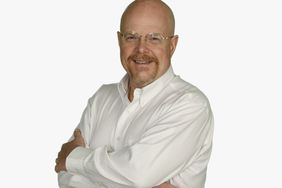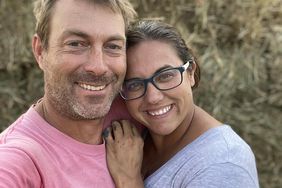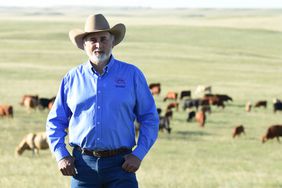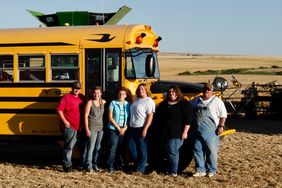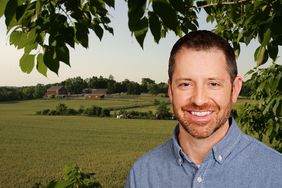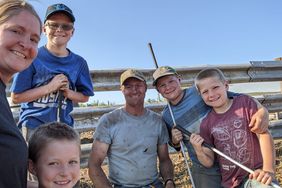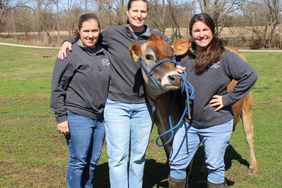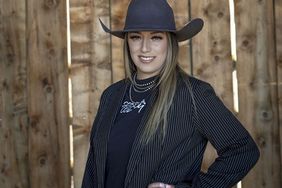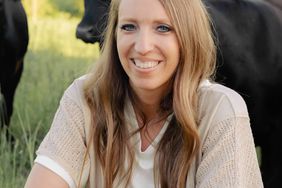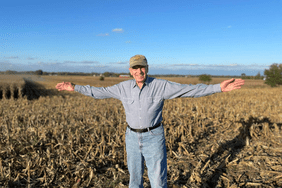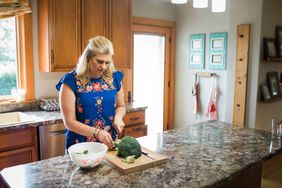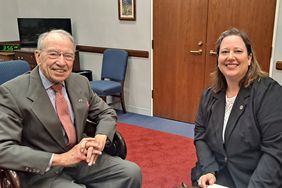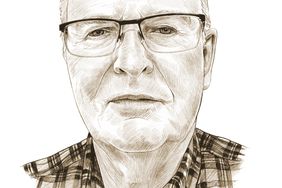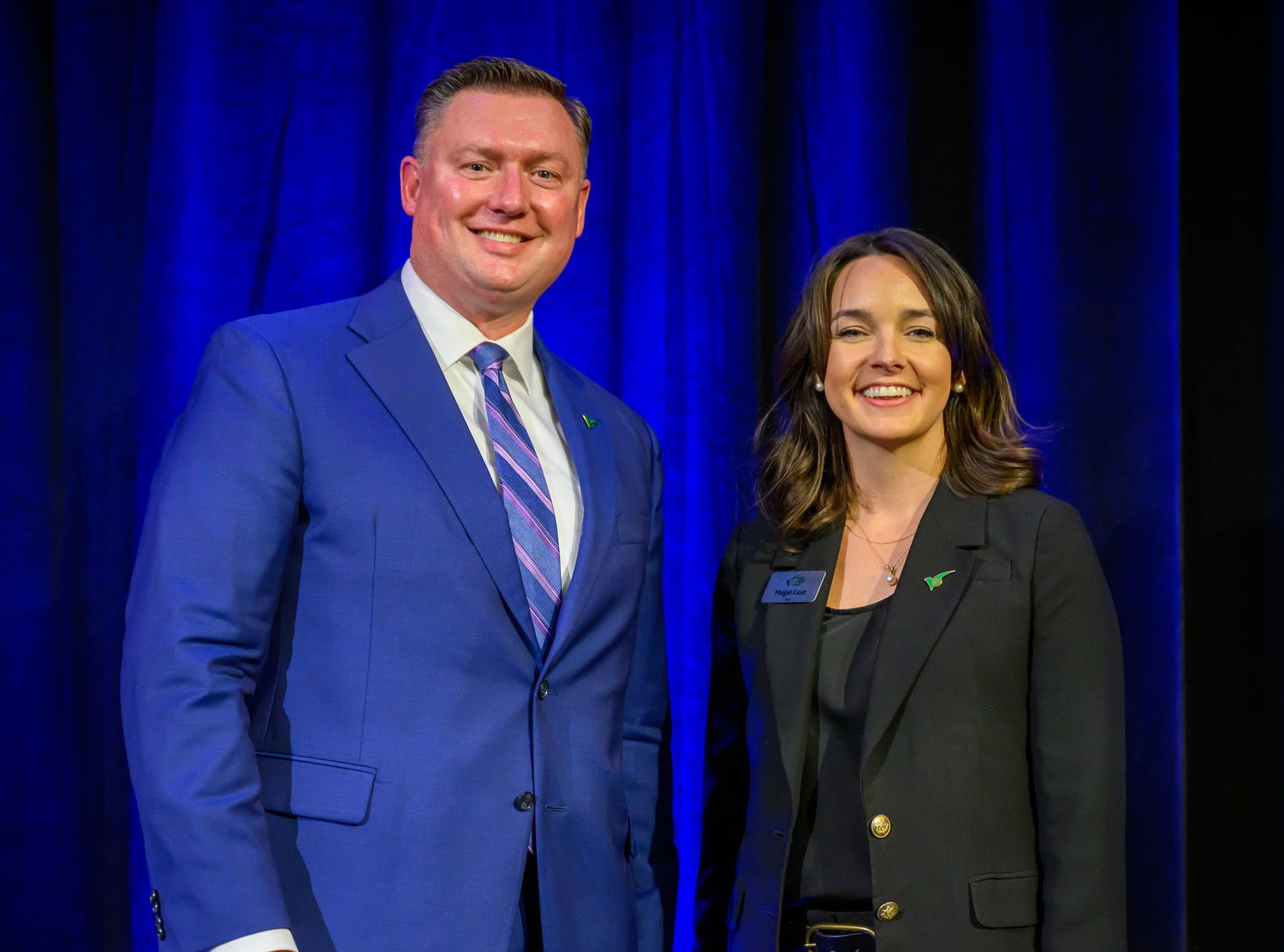
Joseph L. Murphy, United Soybean Board
The United Soybean Board (USB) has announced that Lucas Lentsch will join the organization as its chief executive officer starting Jan. 1, 2024. Lentsch currently serves on the Dairy Management Inc. (DMI) leadership team, which manages the national dairy checkoff. USB’s board, representing farmer leaders from more than 30 states, ratified the decision at its December board meeting. “Lucas Lentsch is the right leader, at the right time, to continue the meaningful work of the soy checkoff and fulfill our vision of delivering sustainable soy solutions to every life, every day,” said Meagan Kaiser, outgoing USB board chair and the selection committee chair. “He is a true thought leader and collaborator with a wealth of checkoff program knowledge, deep agricultural roots, and comprehensive experience across the farm-to-food value chain.”
Growing up on his family’s farm in South Dakota, promoting agriculture, and serving farmers has always remained Lentsch’s true north. As an executive vice president at DMI, Lentsch collaborated between national and local checkoff organizations, nationwide. He previously served as CEO at Midwest Dairy, a 10-state region. Lentsch was the South Dakota Secretary of Agriculture from 2013 to 2016 and is a proud veteran of Operation Iraqi Freedom, serving as a commanding officer with the Army National Guard. Lentsch holds a master of business administration from the University of Minnesota, Carlson School of Management, and a bachelor of science in agriculture from South Dakota State University.
Successful Farming sat down with Lentsch to discuss his new role.
SF: Tell me about the farm you grew up on in South Dakota.
LL: My dad is originally from South Dakota. His family farm was lost in the 1960s and he spent a 20-year career as a skilled tradesman at John Deere in Waterloo, Iowa. At the end of my sixth grade, we moved to South Dakota and I spent my junior high and high school years on a first-generation dairy farm. It was all hands on deck, as they say. That decision to move and be part of the family farm operation was probably the most pivotal moment in my life and formed my passion for agriculture.
SF: What drew you to this position with the United Soybean Board?
LL: Working with farmers is my No. 1 passion. Working in and around agriculture for most of my career, I’ve learned that there are several things that I enjoy personally. Advocating for those that create the food and provide the energy and the stability of our country are passion points. USB brings it all full circle. I get to talk about animal agriculture, something I’m very passionate about. I get to talk about wellness and nutrition, something else I’m really excited about. As a veteran, I’ve been overseas, and I’ve seen the oil fields and the energy dependence we have on foreign countries. As a veteran of Operation Iraqi Freedom, I’ll bet on the soybean and corn fields of America any day for our energy independence.
SF: How will your previous experience as a secretary of agriculture, DMI, and the military shape your tenure?
LL: One thing that I absolutely loved working for South Dakota farmers and ranchers was the complexity of what they faced: the climate and regulations they are working in, the opportunity to make a living in a time when rising input costs are continually constraining cash flow on farms. There’s a lot of challenges out there. Although the checkoff doesn’t get involved in policy, we still live in a world where the policy exists so having a familiarity with that is really important.
My time at Midwest Dairy and DMI taught me about the work of a checkoff along with USDA oversight as a partner. I look forward to having that relationship running at the highest level. At the end of the day, it’s really listening to where farmers want to see the strategic direction of USB go, bringing sustainable solutions to life, and making sure USB is part of every conversation, not only domestically but also internationally.
SF: What are some opportunities that you see for U.S. soybeans?
LL: I think when we are dealing with a domestic population that’s fairly stagnant, we know that domestic supply is going to have its highest and best use in regard to meeting existing demand channels. If we follow the world population, that’s where the opportunity lies, and that includes bringing soy solutions to India and Africa.
I think that infrastructure is the other obvious part. We can grow a crop, but can we get it to market? I think the investments that U.S. soy has made in infrastructure research is vital to our continued success in that space. Getting access to markets and keeping them is really an incredible part of what we can do for the future.
SF: What are some of the biggest challenges and how will you help mitigate them?
LL: I have a half million growers in the country that are producing superb soybeans. I think anytime that you’re creating a quality product, ensuring that quality stays at a very high standard is important, especially when protein is a huge part of the conversation, not just the oil. Some of our largest customers have poultry and livestock, so we must make sure these partners are satisfied with the work that we do and what we produce on their behalf.
In addition to the quality of what we grow, it’s also the innovation and pipeline of opportunities for soy. The excitement that I hear from farmers is filling my belly with fire for the future and I’m really pleased to be here.
SF: What is your leadership style?
LL: I have been fortunate enough in my life to have worked for some incredible leaders. Without a doubt, my preferred leadership style is that of a servant leader, someone who elevates those around them. I aspire to be that, leaning on my teammates and coworkers at USB, but also serving the board of directors and making sure we have a spirit of service to the organization and to agriculture. It’s not just providing leadership for soybeans but providing leadership for agriculture because of the incredible role that soybeans play.
SF: Who has been your biggest mentor and inspiration?
LL: My parents. My mother and father showed me at a young age the value of taking risks — literally betting the farm to make a dream come true. By learning that lesson at an early age, it taught me to take risks in my life. What built me to become who I am is because I had a risk tolerance that I was willing to exercise. I’m very thankful for them. With my dad’s eighth-grade education and my mom graduating with a high school diploma, work ethic on the farm was just as important as education. The look of opportunity often has the look of chore gloves underneath it, so get busy!
SF: It’s almost time for the new year. What resolutions will you make?
LL: One of the resolutions I made a couple years ago is about health and fitness and resolving to take care of oneself. It’s hard to be a leader for an organization or your team if you’re not taking care of yourself. Farmers know that. Getting annual checkups often waits until after harvest, if at all. So, it’s a chance to make sure that we take care of ourselves so that we have our best mind, body, and soul for the future.
SF: What do you want people to know about you?
LL: Well, number one, it’s not about me. I am but a steward of an office that belongs to the soybean farmers of our country, and the United Soybean Board includes the representative leaders of farmers in the U.S. that grow soybeans. It’s their office. For me, that’s in my DNA. That’s how I operate and I’m going to lean into the farmer interests going forward. I will bring to bear the suite of skills that I’ve accumulated over the last 30 years as a leader and as a follower. It’s not just about leadership in the front of the room, it’s leadership in the back of the room as well. Both are equally important. It will be a privilege to serve America’s soybean farmers and continue driving value through sustainable soy solutions.
Lentsch is the proud father of four grown children and will relocate to the United Soybean Board’s headquarters in Chesterfield, Missouri.
For more information on the United Soybean Board, visit unitedsoybean.org.
:max_bytes(150000):strip_icc()/AdrienneHeld4x5crop-a7e3515671bc41c28273a85982f2c67e.jpg)
